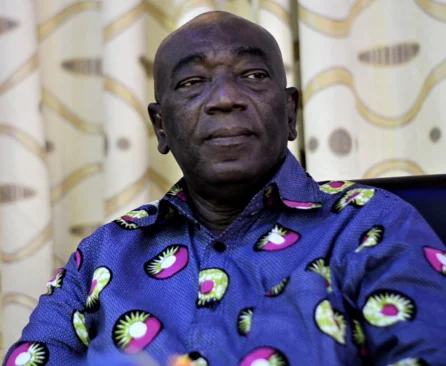The Trades Union Congress (TUC) of Ghana, has renewed its commitment to Pan-Africanism and the struggle for decent work across the continent during the 80th anniversary commemoration of the Fifth Pan-African Congress in Accra.
Addressing the gathering, the General Secretary of the TUC, Joshua Ansah, invoked the words of Ghana’s first President, Dr. Kwame Nkrumah, reminding participants that “the independence of Ghana is meaningless unless it is linked with the total liberation of the African continent.” He noted that the spirit of Nkrumah’s vision remains relevant today as African countries continue to pursue unity and development.
The event, attended by President John Dramani Mahama, former President John Agyekum Kufuor, labour leaders, activists, and Pan-African scholars, highlighted the enduring legacy of the 1945 Pan-African Congress held in Manchester.
The TUC General Secretary described the congress as a defining moment led by workers, intellectuals, trade unionists, youth, women, farmers, and freedom fighters who insisted that the dignity of African people must never be compromised.
He stressed that despite progress; Africa today still faces multiple challenges similar to those that confronted the continent eight decades ago. These include global economic inequalities, labour exploitation, shrinking democratic spaces, climate pressures, illicit financial flows, and mounting debt burdens that limit development.
“As we commemorate this historic anniversary, we also celebrate our collective strength, the same strength that empowered the leaders of 1945 to imagine a free and united Africa,” he said.
The General Secretary emphasized that Pan-African unity remains crucial, not only for political liberation but also for economic and social advancement.
He highlighted the vital role of workers in shaping the Pan-African agenda, recalling that the resolutions of the 1945 Congress demanded fair wages, decent working conditions, social protection, and an end to exploitative labour systems.
He noted that many of the challenges raised decades ago remain unresolved. “The African worker is still confronted with precarious work, suppressed wages, unsafe workplaces, informality, and the absence of social justice in state investment regimes,” he said.
Reaffirming the TUC’s commitment to championing workers’ rights, he pledged support for the African Continental Free Trade Area (AfCFTA) as a tool to uplift workers and strengthen communities.
He called for policies that place workers at the center of Africa’s development strategy, arguing that sustainable progress cannot be achieved without improving the conditions of working people.
He called on African leaders to sustain the Pan-African vision of justice, innovation, and shared prosperity for future generations.


